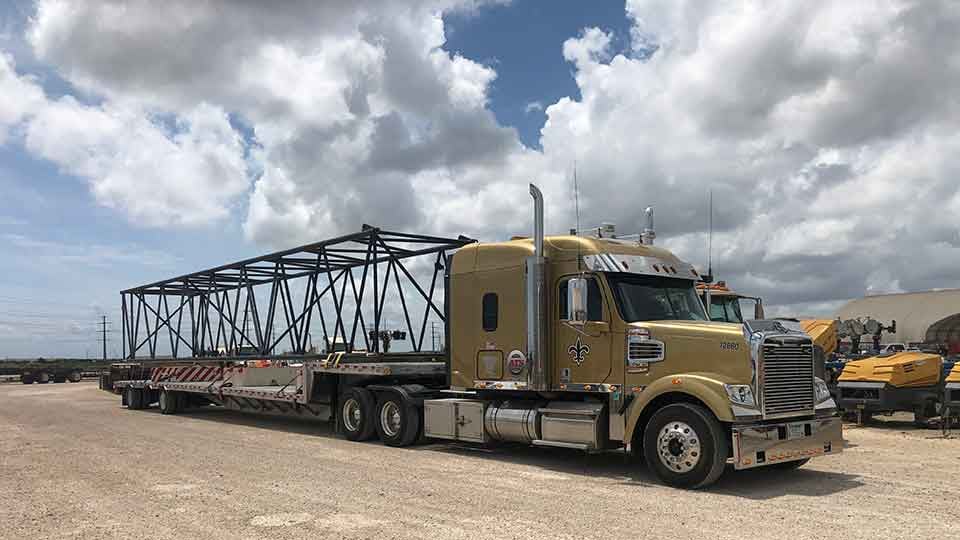Before you load your valuable assets onto a truck, it’s important to know who is behind that truck. Who is the broker or carrier? What are their values? What experience and qualifications do they have with your type of freight?
In this age of information in your pocket, it can be tempting to check out a company's website and then consider your research done.
But think about how much research you did about the location of your business, your financial institution and your manufacturing equipment. Don’t you need that same amount of attention and care when choosing the company that will be distributing your freight across the country?
At Anderson Trucking Service (ATS), we’ve been in business for over 68 years. During that time, we’ve learned what makes a good transportation partnership and some tips and tricks for evaluating everyone we work with.
In this article, you will learn criteria to use when evaluating a carrier, as well as resources to use in your research. At the end, you will have the information you need to vet and choose a reliable shipping provider.
Know What You Need From a Freight Carrier
When vetting a new transportation broker or carrier, make sure they can meet your unique shipping needs. Even reputable carriers can’t provide all services. Many providers have specialties and provide a range of services.
You will be best prepared to compare providers when you are specific about what you are looking for. For example:
- Available vehicles. Ensure the provider has the type of truck and trailer you need, especially if you need reefer trucks, food-grade vehicles or other specialty equipment.
- Areas of service. If you regularly ship to or from certain parts of the country, ask about the number of trucks and drivers in that area.
- Driver requirements. Make sure the broker or carrier can provide adequate drivers with any required specialty credentials, such as TWIC.
- LTL vs FTL capacity. Many carriers specialize in either less-than-truckload (LTL) or full-truckload (FTL) freight. That specialty should match your needs.
Knowing what you need is the first step in finding the best match for you. If you have specific criteria to use when evaluating a provider, you can use that data to eliminate companies who aren’t right for you.

Find Out If the Transportation Provider Is a Match
Every broker or carrier will have information available to help you judge their reliability and suitability. While not the whole story, these resources are a good start for your evaluation process.
Here are some resources for evaluating each company’s fit:
- Their website
- Their social media
- Conversations with their salespeople
Their Website
Visit each company’s website. In addition to contact information, find out how long they’ve been in business. Check out their case studies, blog posts and videos to get an idea of their specialties.
Note that using an official website as a resource is part of the first step. It’s easy for companies to control how they present themselves online. Start with the information the carrier provides, and then cross-check that with other data sources.
Their Social Media
A company’s social media presence can help you understand how they interact with others. Social media is often where companies share educational content they have created. Spend some time reviewing their case studies, blog posts and videos. This can help you learn more about the company and the industry as a whole.
Social media information, of course, comes with some caveats:
- Some companies do not have the resources to invest in social media. Lack of flashy social media content may reflect their investment, rather than their reliability.
- Take caution when reading negative social media reviews. Nearly everyone is likely to have a handful of naysayers. It may be a red flag if most reviews have a consistently negative tone, but if most are overall positive it’s OK to ignore a few negatives.
Conversations With Their Salespeople
The first person you talk to at a company, who is likely to become your primary point of contact, will probably be a salesperson. Vetting this person is crucial, as you will be working with them for the duration of your relationship.
Your salesperson should be a knowledgeable resource about the company, the industry and your needs. Ideally, they will have experience with shipments similar to yours. If they don’t have the resources you are looking for, politely thank them for their time and move on to evaluating other potential carriers.
If you continue to work with the same provider for several years, it is likely that you will get a new point of contact at some point. This doesn’t need to mean a change in your relationship with the carrier. They should have plenty of qualified salespeople and will do their best to match you with someone well-qualified.
Once you have used company-provided resources to learn more about how the potential carrier or broker presents itself, it’s time to verify that information.
Evaluate Shipping Providers Using Outside Data Sources
Information created and curated by the broker or carrier you are evaluating tells part of the story. To get the most accurate picture, use third-party data sources including:
- Review websites
- Personal experiences
- Transportation data sites

Review Websites
Resources like Google reviews, Glassdoor and even Yelp can give you a general understanding of most companies. While not all the reviews on these sites will be directly related to how they do business, knowing how they treat customers and employees will give you a sense of the company’s operations.
When using a general review website for research, be sure to take reviews, especially extreme or outlier views, with a grain of salt. The general tenor is what you are looking for, not just extreme opinions.
Personal Experiences
When possible, vet your transportation provider with others you know. You may be able to learn more from a current or former colleague or even a competitor.
When using personal connections and reviews, ensure the reviewer has the experience you need. If their business is vastly different from yours, ask about the general reliability and way of doing business, rather than their specific capacity for your business.
Transportation Data Sites
In the trucking industry, there are some third-party information sites. While these sites aren’t foolproof, the information on them can be used to verify what you know about the provider.
- Federal Motor Carrier Safety Administration (FMCSA): documentation about registered carriers, including registration numbers.
- Carrier411: a comprehensive network of trucking companies
- My Carrier Packets/AssureAssist: known double brokers (scammers) are listed here
- Gohighway: third-party verification of known carriers
While you might use your own set of criteria to judge transportation providers, the information you get from neutral sources online and in person can provide a minimum level of assurance about the quality of the provider.
Always Use Security Practices With Your Providers
After you have researched and chosen a transportation company, continue to evaluate them. One of the most important steps is to follow good information and security practices, especially with your first few hauls.
When the driver arrives at your location, verify the identity of the driver and the truck. This causes more work for you, but the consequences of not following good security processes can be devastating to your business.
Ask the driver for the following information, and compare it to the data provided by the carrier. If something doesn’t match, stop and figure out why.
- MC number
- License plate
- Driver information
- Bill of lading
- Carrier name
- USDOT number
If possible, use video cameras or photos to record this information. Security is always a primary concern, especially when using a new carrier. Trust your gut instincts. If the new relationship doesn’t feel right, stop. Evaluate what’s happening. Trust is a key component of a business relationship, and you need to have that trust with everyone who works with your business.
Choosing the Right Freight Provider Pays Off
Rather than entrusting your freight to an unvetted carrier, you can follow a few simple steps to evaluate a new shipping broker or carrier — and the time you spend now is likely to pay off later.
Developing a long-term relationship will save time (and money) on future loads.
Once you have evaluated and chosen a provider, be sure to pass on what you’ve learned.
Leave reviews, positive or negative, on appropriate sites. When asked, share your experiences with your business contacts.
After choosing a transportation provider, continue to evaluate them. You may have your own set of criteria you use, or use a standard set of transportation key performance indicators (KPI) as the basis of your ongoing vetting process.
If you’re ready for a quote, our experienced team is happy to help.





